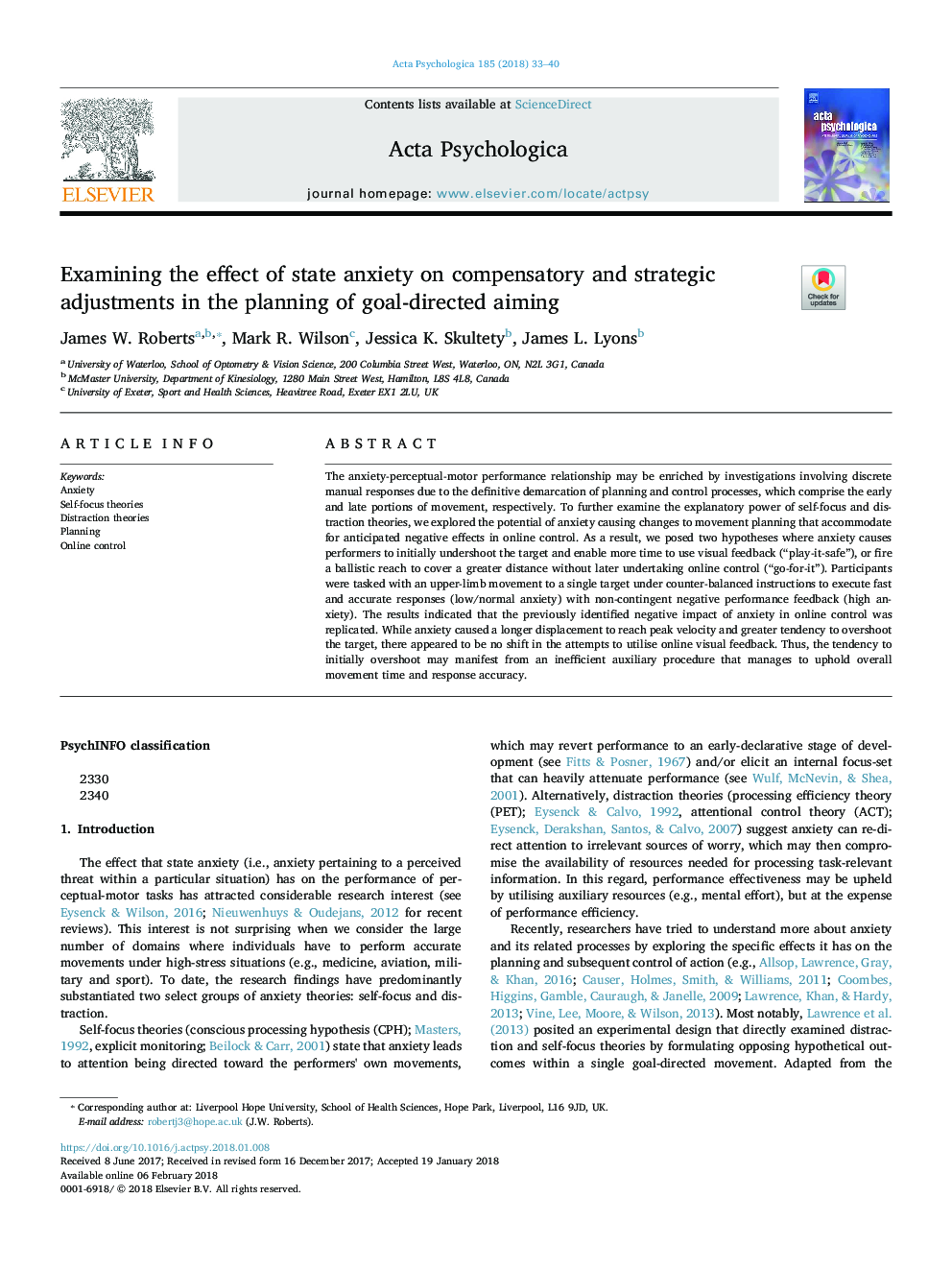| کد مقاله | کد نشریه | سال انتشار | مقاله انگلیسی | نسخه تمام متن |
|---|---|---|---|---|
| 7276699 | 1473573 | 2018 | 8 صفحه PDF | دانلود رایگان |
عنوان انگلیسی مقاله ISI
Examining the effect of state anxiety on compensatory and strategic adjustments in the planning of goal-directed aiming
ترجمه فارسی عنوان
بررسی تأثیر اضطراب دولتی بر تعدیل های جبرانی و استراتژیک در برنامه ریزی هدف هدایت شده
دانلود مقاله + سفارش ترجمه
دانلود مقاله ISI انگلیسی
رایگان برای ایرانیان
کلمات کلیدی
اضطراب، نظریه های خود تمرکز، نظریه های حیرت انگیز، برنامه ریزی، کنترل آنلاین،
ترجمه چکیده
رابطه عملکرد اضطراب-ادراکی-موتور در تحقیقات مربوط به پاسخهای دستی گسسته به دلیل قطعی قطعی برنامه ریزی و کنترل فرآیندهای که بخش های اولیه و دیر جنبش را تشکیل می دهند، ممکن است افزایش یابد. برای بررسی بیشتر قدرت توضیحی نظریه های خود تمرکز و حواس پرتی، پتانسیل اضطراب را ایجاد کردیم که باعث تغییرات در برنامه ریزی حرکتی می شود که برای پیش بینی اثرات منفی در کنترل آنلاین بستگی دارد. در نتیجه، ما دو فرضیه را مطرح کردیم که اضطراب باعث می شود تا هنرمندان ابتدا هدف را از بین ببرند و زمان بیشتری را برای استفاده از بازخورد بصری (بازیابی آن) فراهم آورند، یا از دست رفتن بالستیک برای پوشش بیشتر فاصله بدون بعد تعهد آنلاین کنترل (برای رفتن به آن؟). شرکتکنندگان با حرکتهای فوقانی اندام به یک هدف واحد تحت دستورالعمل های متعادل قرار گرفتند تا پاسخ های سریع و دقیق (اضطراب کم / طبیعی) با بازخورد عملکرد منفی غیرمستقیم (اضطراب بالا) را اجرا کنند. نتایج نشان داد که تاثیر منفی تأثیر منفی اضطراب در کنترل آنلاین تکرار شد. در حالی که اضطراب موجب جابه جایی طولانی برای رسیدن به سرعت حداکثر و گرایش بیشتر به هدف بیش از حد شد، به نظر می رسد هیچ تغییری در تلاش برای استفاده از بازخورد بصری آنلاین نیست. بنابراین، تمایل به ابتدا بیش از حد می تواند از یک روش کمکی ناکارآمد که منجر به حمایت از زمان حرکت عمومی و دقت پاسخ می شود.
موضوعات مرتبط
علوم زیستی و بیوفناوری
علم عصب شناسی
علوم اعصاب شناختی
چکیده انگلیسی
The anxiety-perceptual-motor performance relationship may be enriched by investigations involving discrete manual responses due to the definitive demarcation of planning and control processes, which comprise the early and late portions of movement, respectively. To further examine the explanatory power of self-focus and distraction theories, we explored the potential of anxiety causing changes to movement planning that accommodate for anticipated negative effects in online control. As a result, we posed two hypotheses where anxiety causes performers to initially undershoot the target and enable more time to use visual feedback (“play-it-safe”), or fire a ballistic reach to cover a greater distance without later undertaking online control (“go-for-it”). Participants were tasked with an upper-limb movement to a single target under counter-balanced instructions to execute fast and accurate responses (low/normal anxiety) with non-contingent negative performance feedback (high anxiety). The results indicated that the previously identified negative impact of anxiety in online control was replicated. While anxiety caused a longer displacement to reach peak velocity and greater tendency to overshoot the target, there appeared to be no shift in the attempts to utilise online visual feedback. Thus, the tendency to initially overshoot may manifest from an inefficient auxiliary procedure that manages to uphold overall movement time and response accuracy.
ناشر
Database: Elsevier - ScienceDirect (ساینس دایرکت)
Journal: Acta Psychologica - Volume 185, April 2018, Pages 33-40
Journal: Acta Psychologica - Volume 185, April 2018, Pages 33-40
نویسندگان
James W. Roberts, Mark R. Wilson, Jessica K. Skultety, James L. Lyons,
